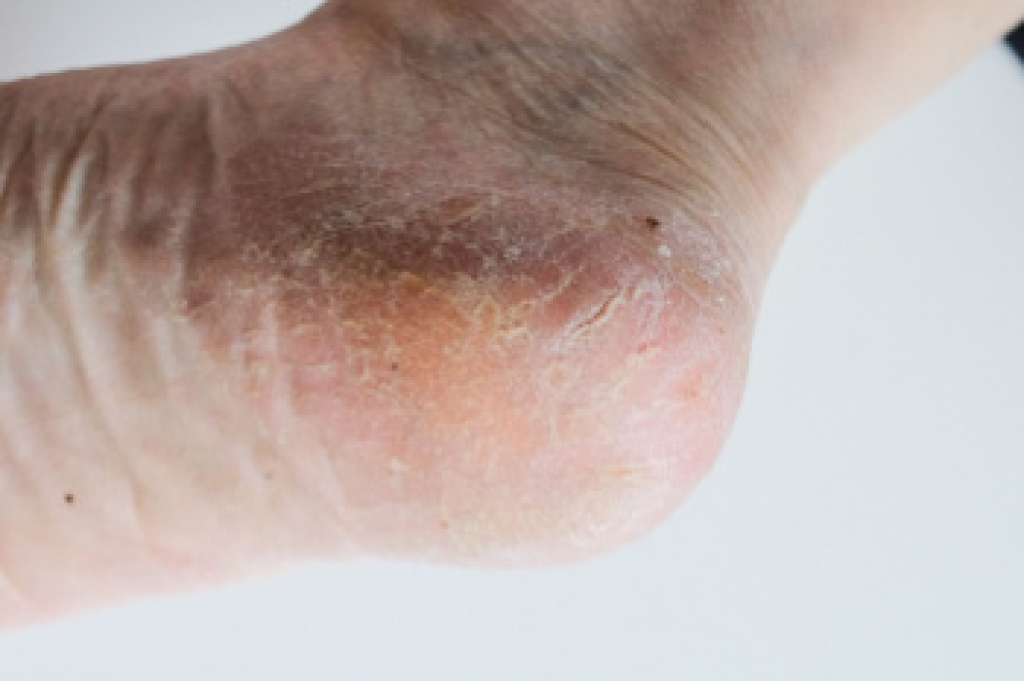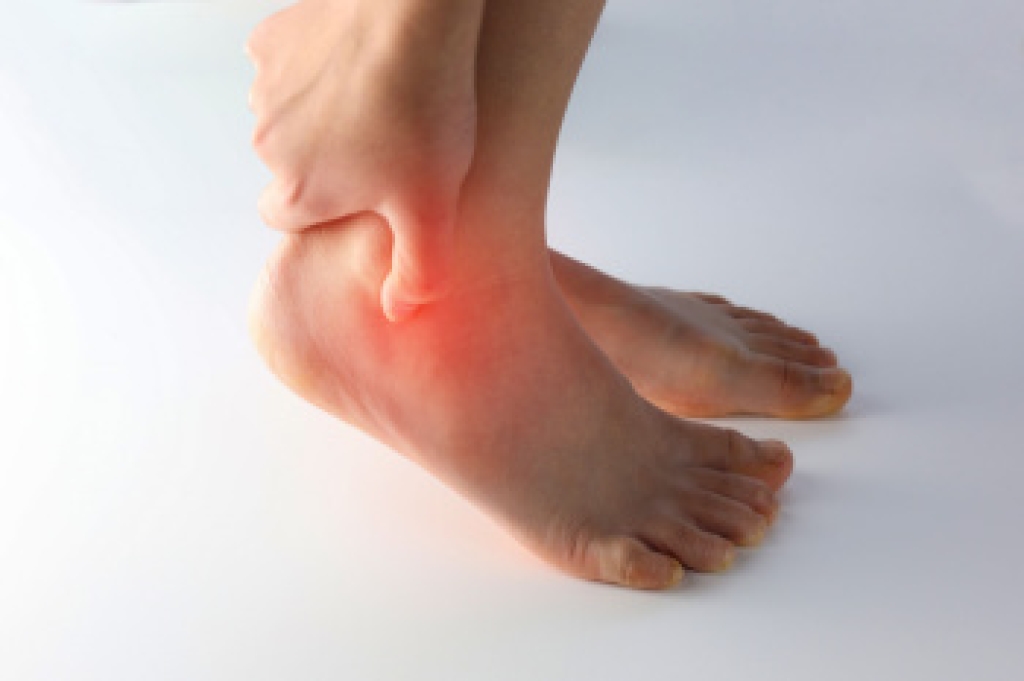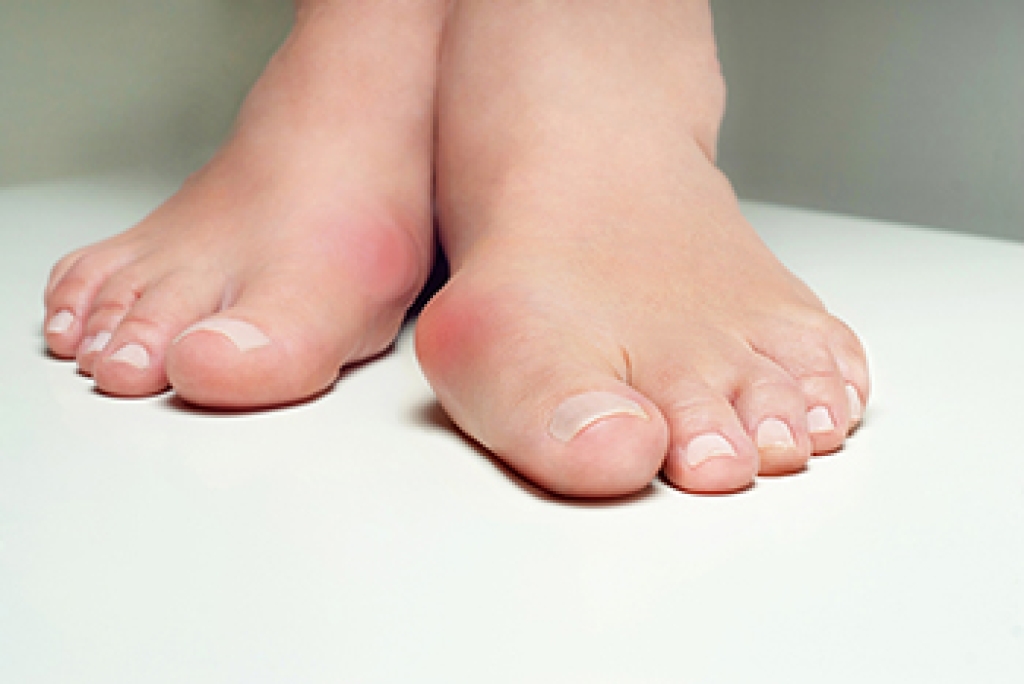Blog
Causes and Symptoms of Cracked Heels

Cracked heels are a common foot condition that occurs when the skin surrounding the heel becomes excessively dry, thickened, and unable to stretch properly. As pressure builds, the skin splits, leading to visible cracks that may cause pain, bleeding, or discomfort. Common symptoms include rough, flaky skin, redness, and deep fissures along the heel. Cracked heels can develop due to vitamin deficiency, dry skin and dehydration, in addition to mechanical stress, prolonged barefoot walking, and excess pressure on the feet. Fungal infections and other skin conditions may also weaken the skin and contribute to cracking. A podiatrist can identify the underlying cause, provide professional debridement, recommend moisturizing treatments, and address infections or biomechanical issues. If you have painful cracked heels, it is suggested that you consult a podiatrist who can offer effective relief and treatment solutions, which may include prescribed medication.
Cracked heels are unsightly and can cause further damage to your shoes and feet. If you have any concerns, contact one our of podiatrists from The Foot and Ankle Specialists. Our doctors can provide the care you need to keep you pain-free and on your feet.
Cracked Heels
Cracked heels appear unappealing and can make it harder for you walk around in sandals. Aside from looking unpleasant, cracked heels can also tear stockings, socks, and wear out your shoes. There are several methods to help restore a cracked heel and prevent further damage.
How Do You Get Them?
Dry skin is the number one culprit in creating cracked heels. Many athletes, walkers, joggers, and even swimmers suffer from cracked heels. Age and skin oil production play a role to getting cracked heels as well.
Promote Healing
Over the counter medicines can help, especially for those that need instant relief or who suffer from chronic dry feet.
Wear Socks – Wearing socks with medicated creams helps lock in moisture.
Moisturizers – Applying both day and night will help alleviate dryness which causes cracking.
Pumice Stones – These exfoliate and remove dead skin, which allows for smoother moisturizer application and better absorption into the skin.
Change in Diet
Eating healthy with a well-balanced diet will give the skin a fresh and radiant look. Your body responds to the kinds of food you ingest. Omega-3 fatty acids and zinc supplements can also revitalize skin tissue.
Most importantly, seek professional help if unsure how to proceed in treating cracked heels. A podiatrist will help you with any questions or information needed.
If you have any questions, please feel free to contact our offices located in Houston and Deer Park, TX . We offer the newest diagnostic and treatment technologies for all your foot care needs.
Snow, Cold, and Sore Feet

Snowy conditions and cold temperatures can place stress on the feet, often leading to soreness, stiffness, and changes in the way people walk. Winter boots are frequently chosen for warmth or traction, yet many lack proper support, place excess pressure on the ball of the foot, or restrict natural movement. Winter activities, such as skiing, snowboarding, or ice skating, require specialized footwear that can further strain the feet and ankles. A podiatrist can evaluate how winter footwear and seasonal activities affect foot mechanics and diagnose tendon strain, nerve irritation, or joint inflammation. Treatment may include professional guidance on footwear selection, custom orthotics, gait evaluation, and medical care designed to reduce pain and protect foot structure throughout the winter months. If your feet are sore from severe winter weather, it is suggested that you make an appointment with a podiatrist for an exam, diagnosis, and treatment.
Foot Pain
Foot pain can be extremely painful and debilitating. If you have a foot pain, consult with one our of podiatrists from The Foot and Ankle Specialists. Our doctors will assess your condition and provide you with quality foot and ankle treatment.
Causes
Foot pain is a very broad condition that could be caused by one or more ailments. The most common include:
- Bunions
- Hammertoes
- Plantar Fasciitis
- Bone Spurs
- Corns
- Tarsal Tunnel Syndrome
- Ingrown Toenails
- Arthritis (such as Gout, Rheumatoid, and Osteoarthritis)
- Flat Feet
- Injury (from stress fractures, broken toe, foot, ankle, Achilles tendon ruptures, and sprains)
- And more
Diagnosis
To figure out the cause of foot pain, podiatrists utilize several different methods. This can range from simple visual inspections and sensation tests to X-rays and MRI scans. Prior medical history, family medical history, and any recent physical traumatic events will all be taken into consideration for a proper diagnosis.
Treatment
Treatment depends upon the cause of the foot pain. Whether it is resting, staying off the foot, or having surgery; podiatrists have a number of treatment options available for foot pain.
If you have any questions, please feel free to contact our offices located in Houston and Deer Park, TX . We offer the newest diagnostic and treatment technologies for all your foot care needs.
Nighttime Ankle Discomfort and What It May Mean

Ankle pain that appears at night can feel unsettling because it often develops when the body is finally at rest. Some people notice a dull ache after a long day, while others feel sharp twinges that interrupt sleep. This discomfort may come from lingering inflammation, subtle joint irritation, nerve sensitivity, or strain in the tendons that support the ankle. In some situations, swelling becomes more noticeable once the feet are elevated, and in others tight muscles create pressure that becomes clearer when movement slows. Understanding the cause is important because nighttime symptoms can signal early joint changes, overuse, or an untreated injury that needs attention. A podiatrist can examine the ankle, assess strength and mobility, and recommend care that supports healing and reduces irritation. If your ankle pain continues to disturb your rest or worsens over time, it is suggested that you see a podiatrist for an accurate diagnosis and effective treatment solutions.
Ankle pain can have many different causes and the pain may potentially be serious. If you have ankle pain, consult with one our of podiatrists from The Foot and Ankle Specialists. Our doctors will assess your condition and provide you with quality foot and ankle treatment.
Ankle pain is any condition that causes pain in the ankle. Due to the fact that the ankle consists of tendons, muscles, bones, and ligaments, ankle pain can come from a number of different conditions.
Causes
The most common causes of ankle pain include:
- Types of arthritis (rheumatoid, osteoarthritis, and gout)
- Ankle sprains
- Broken ankles
- Achilles tendinitis
- Achilles tendon rupture
- Stress fractures
- Tarsal tunnel syndrome
- Plantar fasciitis
Symptoms
Symptoms of ankle injury vary based upon the condition. Pain may include general pain and discomfort, swelling, aching, redness, bruising, burning or stabbing sensations, and/or loss of sensation.
Diagnosis
Due to the wide variety of potential causes of ankle pain, podiatrists will utilize a number of different methods to properly diagnose ankle pain. This can include asking for personal and family medical histories and of any recent injuries. Further diagnosis may include sensation tests, a physical examination, and potentially x-rays or other imaging tests.
Treatment
Just as the range of causes varies widely, so do treatments. Some more common treatments are rest, ice packs, keeping pressure off the foot, orthotics and braces, medication for inflammation and pain, and surgery.
If you have any questions please feel free to contact our offices located in Houston and Deer Park, TX . We offer the newest diagnostic tools and technology to treat your foot and ankle needs.
Facts About Bunions

A bunion is a bony prominence that forms at the base of the big toe when the joint becomes misaligned, and the tip of the toe gradually shifts toward the others. This condition often develops when the foot rolls inward, as seen with flat feet, placing extra stress on the joint, and it can be worsened by wearing tight or pointy shoes that crowd the toes. Common symptoms include pain, swelling, redness, and limited motion of the toe joint that may affect walking and daily comfort. Risk factors include family history, foot structure, and long-term footwear choices. A podiatrist can evaluate the cause, recommend custom orthotics, footwear changes, or advanced treatment options. If you have symptoms of a bunion, it is suggested that you consult a podiatrist who can offer effective relief and management tips.
If you are suffering from bunions, contact one our of podiatrists of The Foot and Ankle Specialists. Our doctors can provide the care you need to keep you pain-free and on your feet.
What Is a Bunion?
A bunion is formed of swollen tissue or an enlargement of boney growth, usually located at the base joint of the toe that connects to the foot. The swelling occurs due to the bones in the big toe shifting inward, which impacts the other toes of the foot. This causes the area around the base of the big toe to become inflamed and painful.
Why Do Bunions Form?
Genetics – Susceptibility to bunions are often hereditary
Stress on the feet – Poorly fitted and uncomfortable footwear that places stress on feet, such as heels, can worsen existing bunions
How Are Bunions Diagnosed?
Podiatrists often perform two tests – blood tests and x-rays – when trying to diagnose bunions, especially in the early stages of development. Blood tests help determine if the foot pain is being caused by something else, such as arthritis, while x-rays provide a clear picture of your bone structure to your provider.
How Are Bunions Treated?
- Refrain from wearing heels or similar shoes that cause discomfort
- Select wider shoes that can provide more comfort and reduce pain
- Anti-inflammatory and pain management drugs
- Orthotics or foot inserts
- Surgery
If you have any questions, please feel free to contact our offices located in Houston and Deer Park, TX . We offer the newest diagnostic and treatment technologies for all your foot care needs.

